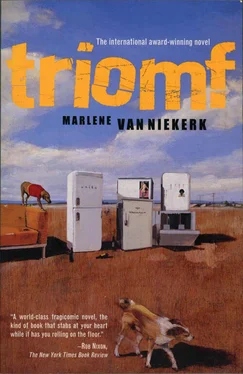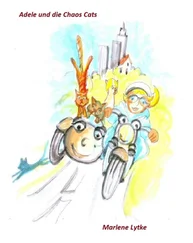‘That message is from Maggie Rip,’ Treppie said, laughing his little half-laugh. So she asked Treppie who Alex and Maggie Rip were. Did he know them? She thought maybe they were connections of the Chinese. No, Treppie said, he didn’t know them, but he could guess. Guess what? she asked. Then he said he could guess Alex was probably just another lost case, and Maggie was worn-out from letting rip so much. Treppie’s full of nonsense. She still doesn’t know what’s supposed to be so funny about that. And then there was the time Treppie almost laughed himself to death over Frieda’s wedding dress. This Frieda was also someone he didn’t know.
‘Hell, just look at all these wedding dresses for sale,’ Treppie said, reading up and down about the dresses with a bigger and bigger smile on his face, until he burst out laughing: ‘“Wedding dress off-white. Very large. Veil and train. Satin shoes size 11. Instep supported. Brand new. Personal tragedy. Contact Frieda or leave message.”’ Poor Frieda, whoever she is, she thought, but Treppie walked up and down the house and pissed himself. Pop said Treppie had delicate nerves. That may be so, she said, but he wasn’t delicate with her. Then Pop said she should just be thankful she wasn’t Frieda, who didn’t have anyone in the whole world. At least they still had each other. Treppie heard what Pop said, ’cause he’d stopped laughing now, and then he told her she must listen to Pop. Pop had a sense of perspective.
Well, whether Pop’s got one or not, that’s one of Treppie’s favourite words. Perspective. It’s the one word she remembers Treppie using over and over when they worked out the story for Lambert — that’s now the story of their family set-up and about where Lambert actually comes from. It was all Treppie’s idea. He said they should tell Lambert a story that would give him a perspective on the matter, one that both he and the rest of them could live with. And that’s how they came upon the distant-family story. That Pop was a distant Benade from the Cape. A Benade who stole her heart at a garment workers’ dance when he played a solo on his mouth organ, the only thing he still had left from his late father. And how they were married in community of property by a magistrate, ’cause that was the quickest and cheapest way to do it, even though they had far more in common than just property. And how afterwards there was a dinner and dance in the backyard at the Vrededorp house. And how Treppie was the master of ceremonies, making an unforgettable speech. About ‘the holiness of marriage’ and ‘the godliness of the generations’. ’Cause he had to play minister as well. The magistrate seals the community of property, not the joining of souls.
Treppie practised that speech over and over again. That was the meat of the perspective, he said. Mind you, they all practised like mad on that perspective. Treppie said it had to be drilled into them so hard they’d also start thinking it was true after a while. He said a person needed that kind of perspective in life. No, he said, it was more. It kept you alive. Otherwise you wouldn’t have a hope in hell. Actually, he said, the whole world and the whole business we called life and everything that went with it was just one big war of perspectives. One big circus — it just depended on how you looked at it. It was all in the mind, anyway. The point was you had to have one. A perspective, so you could fight. Or a different one, so you could laugh. Treppie says most people’s perspectives are just bubbles to keep their heads above water. That’s what you call a ‘saving perspective’.
Well, it’s not like they’re exactly on top of things. They just muddle along through the rubble. But that perspective of Treppie’s saved their backsides on many occasions. When Lambert started getting old enough to ask questions, they could tell him all about that heart-stealing dance and the Vrededorp wedding. About the people who came, what they were wearing and what they had to eat. Doughnuts and peanuts and Swiss roll. And everything Treppie had to say, as brother of the bride and master of ceremonies. The family as the cornerstone of the volk, and the near and distant family as the stronghold of something else. A lot of rubbish, she sees now, but when children began pestering Lambert at school with all kinds of gossip about the Benades, they could at least tell him what to say.
Then they’d dish up that old story of theirs again. Just like they practised it all those years ago, when Treppie made her wear Old Mol’s marriage dress and Pop had to put on his black jacket with the black trousers. Not a suit, but at least both pieces were black. She used to wish Treppie would practise his speech and get done with it, ’cause that wedding dress was much too tight for her. She was already seven months pregnant with Lambert and he was a huge bastard. Treppie allowed them to practise the rest, about the distant family, in ordinary clothes, but for his speech he said they must dress up like a bride and groom. So they’d get a good grip on the perspective. It was like kissing someone with measles, he said. You had to expose yourself if you wanted to be immune.
Then Treppie would get up on a chair and hold up his hand for silence. Her and Pop had to shout ‘Speech! Speech!’ in their wedding clothes. And Pop had to whistle like lots of people, ’cause the way the story went there were almost a hundred people at the wedding. All of them garment workers and their fiancés.
Then Treppie would start: ‘Ladies and gentlemen, my dear sister Mol and my brother-in-law from the old colony — distant family, but still a shoot from the same tree …’ Sometimes he would say ‘pip from the same watermelon’.
And then they had to shout ‘Hear! Hear!’ and sing ‘For he’s a jolly good fellow’ all at the same time, the way lots of tipsy people do at a party.
When the applause was loud enough Treppie would raise his hand and carry on again. He always started with ‘Every family has its secrets’, or ‘Every family has its fuck-ups.’ The second sentence was: ‘But all that counts is that we have each other and a roof over our heads.’ His third sentence was addressed to them. He pointed his finger at her. At her belly. And at Pop in his suit, and then he said: ‘Go out and multiply and fill the earth, or, as we say in good Afrikaans, sow the seed — sow the seed, oh sow the seed of the watermelon.’
After every sentence they had to cheer. And after the last sentence he made them sing ‘How the hell can we believe him’.
Treppie told Lambert this was just the intro, nice and jolly, to make the wedding guests feel comfortable. The first duty of a master of ceremonies, he said, was to sweeten the audience so they could swallow the bitter pill.
The bitter pill was the serious part in the middle.
About how it was inevitable and predestined that these two people should come together, and how they had to stand by each other, come hell or high water. How they had to seek out their own destiny, live with what they had, and carry their own cross, the cross being the burden of the secrets and the weight of the fuck-ups that always came afterwards. And how they had to keep looking north. Look north, fuck forth! How the home was the cornerstone and the family the stronghold.
And how Pop had to understand he was now head of the house, and how, by the sweat of his brow, he’d have to reap what he sowed in the flush of his youth.
At this point in the practice Pop would pluck off his jacket and walk over to Treppie, who was still standing on a chair. Pop would tell him he’d better get off his pulpit now, ’cause he, Treppie, had played an equal part in the whole business, and who was he all of a sudden to make out he was so high and mighty?
Then Treppie told Pop he shouldn’t be such a spoilsport. Had he forgotten? It was just a perspective they were trying to stamp on to the fruit of their loins here. For their own survival. Fruit of their loins, yes, well.
Читать дальше












